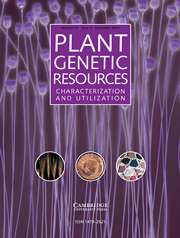Article contents
Assessment of genetic divergence in diploid cotton (Gossypium arboreum L.) germplasm using fibre quality traits
Published online by Cambridge University Press: 04 November 2020
Abstract
Cotton is one of the most important crops among natural fibres. Fibre quality determines the spinning ability, which is negatively correlated with yield and yield-contributing traits. Limited efforts have been made to improve fibre quality and yield in diploid cotton. Therefore, screening a large panel of germplasm lines can help identify genotypes with better fibre quality and yield. We evaluated 712 desi cotton genotypes for fibre quality traits. The genotypes showed a significant difference for all the traits, suggesting considerable variability for fibre quality improvement. Fibre length and strength showed high phenotypic and genotypic coefficients of variation. Heritability was high for fibre strength, length, and elongation. Fibre length and strength were positively correlated; however, micronaire was negatively correlated with these two traits. Superior accessions were identified for fibre length (11), strength (20), uniformity (7), and elongation (25) among genotypes. Most of the desi lines (71%) had medium micronaire values. Twenty accessions identified were ideal for spinning, showing the fibre strength-to-length ratio of one. Cluster analysis based on Euclidean distance grouped all 712 accessions into four major clusters. Principal component analysis biplot revealed that accessions AC3418, 360-SP1, AC3522B, Kanpur A, Gao16CB-9, and AC3370 were genetically diverse. The superior accessions for fibre quality identified in this study are potential lines for the diploid cotton improvement programme.
- Type
- Research Article
- Information
- Copyright
- Copyright © The Author(s), 2020. Published by Cambridge University Press on behalf of NIAB
References
- 4
- Cited by


